
On Saturday morning, Gyanraj Rai ate his breakfast, headed to Downing Street, and began a protest about his pension. He hasn’t eaten since.
“Better to die than be a coward” is a motto of the Nepalese Gurkha soldiers, who have been an integral part of the British Army for more than 200 years.
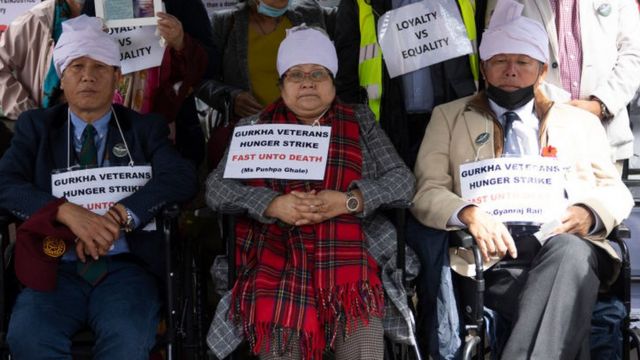
And 63-year-old Mr Rai says he is prepared to die – to starve to death – if the government does not agree to make his pension equal to the British soldiers he fought alongside for 20 years.
Next to him in wheelchairs near the Downing Street gates are ex-soldier Dhan Gurung, 59, and Gurkha widow Pushpa Rana Ghale, 59, who has travelled from Nepal.
On Wednesday they entered their fifth day on hunger strike. They don’t even have a gazebo to shelter them from the elements. It was taken down by the Met Police, who said it was “in breach of local bylaws.”
“This is the last resort to go to hunger strike to the death,” Mr Rai tells the BBC. “We want to be treated equally with the British in every aspect. That’s why we are here, prepared to die.”
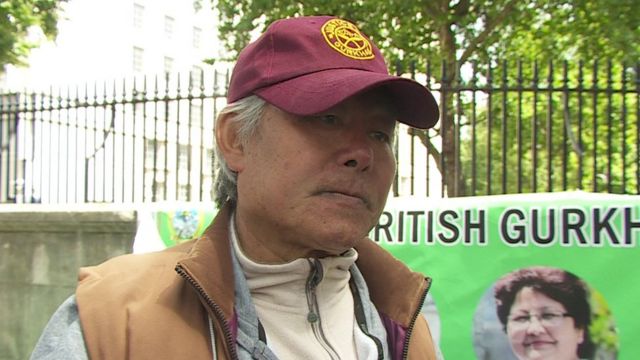
More than 200,000 Gurkhas fought in the two world wars, and in the past 50 years they have served in Hong Kong, Malaysia, Borneo, Cyprus, the Falklands, Kosovo, Iraq and Afghanistan.
Yet Gurkhas who retired before 1997 receive a fraction of the pension the rest of the British Army receive.
The Gurkha Pension Scheme (GPS) was based on Indian Army rates for those with at least 15 years’ service.
The government says it was designed for retirement in Nepal, where the cost of living is significantly lower than in the UK.
But in 2009, all retired Gurkhas won the right to live in the UK, following a high-profile campaign led by actress Joanna Lumley, whose father served with the 6th Gurkha Rifles.
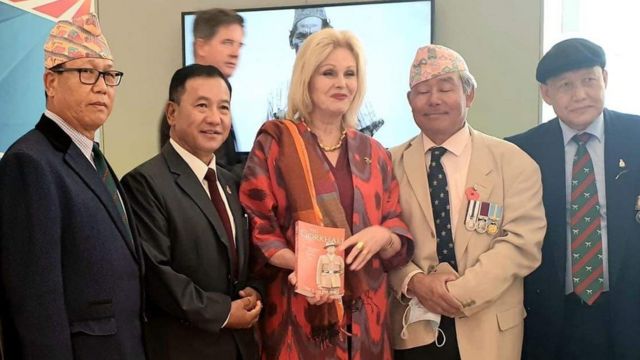
Mr Rai, who had travelled from Reading for the protest, says he followed his uncles to join the British Army aged 17.
“During service we were given a very small amount of salary compared to our British counterparts,” he says.
“And after our service, the pension was very low. My pension was only £47 a month, where a British veteran used to get over £800 a month.”
He says his lump sum on leaving the army was £3,000 compared to that of a British veteran who received between £60,000 and £70,000.
He says today he receives a monthly pension of £350 compared to British ex-soldiers of the same rank who receive £1,200 to £1,300.
When the BBC put these figures to the Ministry of Defence it did not dispute them.
This is not the first time Mr Rai has gone on hunger strike. He did not eat for 14 nights and 15 days in 2007.
He only stopped when pension rules were changed to give serving Gurkha soldiers equal pension rights with other service personnel in the UK.
But the British Gurkha Welfare Society said about 25,000 men who had retired before 1 July 1997 were denied the opportunity to transfer into UK armed forces pension schemes.

Who are the Gurkhas?
- Since 1947, the Gurkhas have fought for the British Army all over the world, receiving 13 Victoria Crosses between them
- During the two world wars 43,000 Gurkha men lost their lives
- There are about 3,500 men in the Gurkha Brigade but there were 112,000 during World War Two
- The Gurkhas are now based at Shorncliffe near Folkestone, Kent – but they are not British citizens
- Soldiers are selected for 200 places each year from young men generally living in the hills of Nepal
- The selection process has been described as one of the toughest in the world and is fiercely contested
- Young hopefuls have to run uphill for 40 minutes carrying a wicker basket on their back filled with rocks weighing 70lbs

Dhan Gurung, 59, from Basingstoke, says he followed his grandfather’s tracks into the Gurkhas – and into poverty.
He served the maximum time permitted for Gurkha soldiers, which was 15 years unless they were granted yearly extensions.
He called it a “big discrimination” that he was forced to retire when the normal term of engagement for his British counterparts was 22 years.
“When I retired in 1994 my monthly pension was £20 only,” he says. “How I survived…with my wife, my daughter and my son.”
He says Gurkha families in Nepal were left in poverty so their children could not get an education.
“Now they working in Saudi Arabia, Malaysia, Israel all over the world in dirty, difficult and dangerous jobs because they didn’t have enough education,” he says.
“So they have no choice because of penny pinching pay from the British government.”
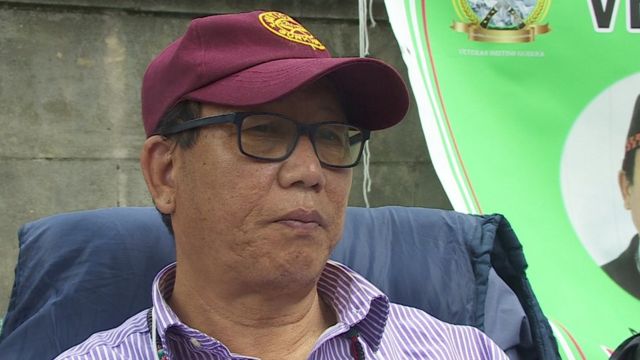
When he remembers the Gurkhas who died fighting for the British Army, Mr Gurung says he feels pain and his “blood gets hot”.
“I remember those who were wounded in the war, after finished war they said ‘You are wounded you are not fit for the army’. That’s why they sent them back barefoot, empty-handed without pension. Once I remember those things it’s really heart-breaking.”
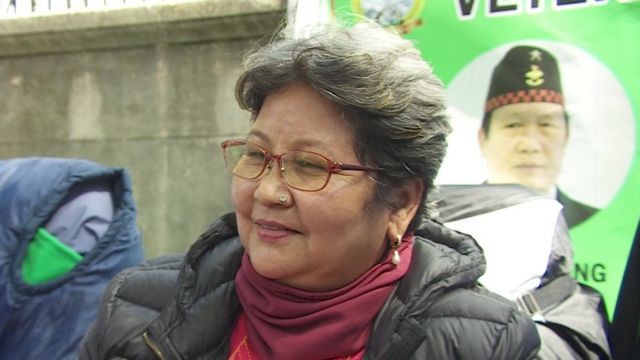
Outside Downing Street, Mr Gurung looks tired. The days without food are taking their toll – but he says he has “full hope, real optimism they will address our issues”.
“That’s the reason I’m sacrificing my life,” he says. “There is no way they can run away from these issues because it is 207 years of historical injustice.
“Our message is let’s form a high level of dialogue team, confirm the day for the dialogue. If they do that we will postpone our hunger strike.
“If they solve the problem we will stop. If they don’t want to solve the problem I don’t care even if I die because I already sacrificed my life.”
A Ministry of Defence spokesperson says: “We greatly value the huge contribution Gurkhas make to the British Army and ensure they are supported with a generous pension and medical care during retirement in Nepal.
“We are committed to ensuring the Gurkha Pension Scheme is sustainable and fair alongside other UK public sector pensions.”
Source –BBC


Comment